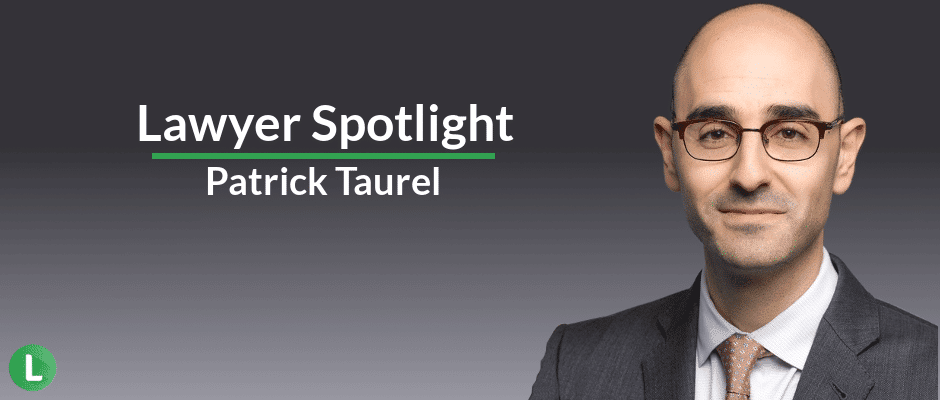Lawyer Spotlight: Patrick Taurel


Washington, D.C.-based immigration attorney, Patrick Taurel represents clients from all over the world in their efforts to stay in the United States. An immigrant himself, he loves helping others to get the chance to be part of this country.
I’m an immigration lawyer at a private firm called Clark Hill. My practice focuses on asylum, removal defense, federal court litigation, and I help people obtain benefits before the various agencies that handle immigration benefits. I’ve been involved in immigration law ever since I graduated law school. A typical day might involve meeting with clients, researching the law, going to immigration court or an immigration office, and writing briefs to higher courts: the Board of Immigration Appeals, the tribunal that sits above the immigration courts, and above that, to the United States Court of Appeals, usually the 4th Circuit Court of Appeals.
I worked in the immigration law clinic at my law school and represented an asylum seeker from Tibet. It just was so clearly the most important thing I’d ever done in my life and I wanted more of it.
I remained hooked because I find this area of the law so interesting. It’s so intellectually challenging and I love working with clients. And winning their cases and giving them the chance to become part of this country which they’ve worked so hard to become a part of.
When people ask me should I go to law school, my advice is advice that I myself didn’t follow, which is: you’ve got to know why you’re going.
I think I went to law school because I studied philosophy undergrad and I thought that it was a logical next step because I enjoyed constructing and deconstructing arguments. I was also interested in history and government, I liked public speaking, I liked debating — and when I got to law school, I realized that all of these subjects really interest me. I was also 27 and I didn’t know what I was going to do.
Stop their deportation. That’s the thing that is the scariest to clients. But there are lots of ways we help them short of that.
One valuable service we provide is getting clients out of immigration detention. We also sometimes reunite a family that’s been separated for a long time where the immigrant needed to apply for a visa from abroad. But, as I mentioned, the most stress-inducing scenario our clients face is being in deportation proceedings. In some cases, deportation cases can be death penalty cases: our clients might be terrified of what awaits them if they go back to their native country. So the stakes couldn’t be higher. And if you can prevent that – and not only prevent it but get them lawful status in this country, get them a Green Card – that’s just something that changes their life and changes the lives of generations to come. So, that is the most gratifying thing we do for our clients.
When I was in Idaho, most of our clients were not just Mexican, but from two States in Mexico, Zacatecas or Michoacán. Despite that, the range of legal issues and challenges we faced was wide and there was never a dull moment at Maria Andrade’s office. The immigrant community is a bit more diverse in the DC area. You’ve got lots of immigrants from the Middle East, Southeast Asia, Africa, Central America and from South America as well. Our clientele comes from all over the world.
A journalist, I think. I’m a news junkie. I love it. And I like to write. I like to convey complex information to make it digestible and interesting.
Or a teacher, which is another field that requires transmitting information in a clear and engaging way. I would like to teach in a practical context. I used to dream about being a clinical law professor where you still have the chance to represent people, but also impart knowledge to students.
I feel like my clients do know me a little bit. In order to effectively represent somebody, at least in the immigration context, it’s my job to get to know the clients inside and out and sometimes people open up more when you share a little about yourself. I do that because I’m not shy and it helps build the rapport I need for my clients to know and trust me enough to tell me the really personal stuff. When I have an asylum client who’s been raped or endured something terrible like that, that’s not something that’s going to come out if she doesn’t know me, like me, and trust me. And that builds over time.
Right now, it’s in my home with my baby and my wife.
I would also say, if I could be with them on a beautiful beach somewhere, that would be even better.
LeanLaw believes that lawyers are heroes, critical to the rule of law in a free society. You can find out more about hero lawyer Patrick Taurel here. If you know a heroic lawyer whom we should spotlight, please let us know in the comments below.
Join the LeanLaw Movement!
If you’re interested in learning more about the Lean Law Movement, give me a call or shoot me an email. I started LeanLaw with the mission that every lawyer should have a lean practice.
Gary Allen, Founder and Practicing Attorney